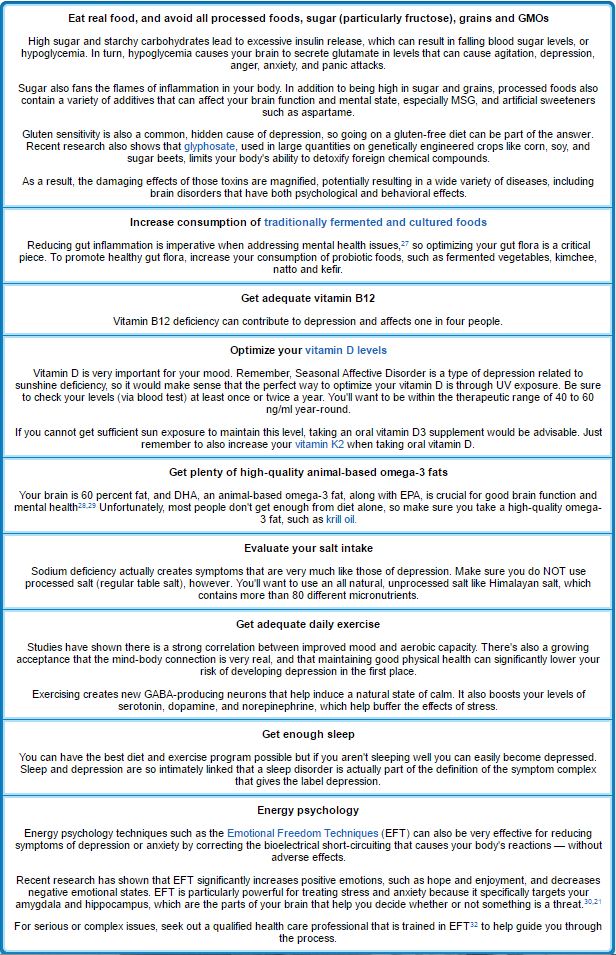Forget Dangerous Antidepressants
By Dr. Mercola
One in 20 Americans over the age of 12 struggles with depression1 and 11 percent of the U.S. population over the age of 12 is on antidepressant medication.2 This, despite overwhelming evidence showing that antidepressants are no better than placebo in terms of effectiveness.
As noted in a 2014 paper on antidepressants and the placebo effect, published in the journal Zeitschrift Fur Psychologie:3
“Antidepressants are supposed to work by fixing a chemical imbalance, specifically, a lack of serotonin in the brain. Indeed, their supposed effectiveness is the primary evidence for the chemical imbalance theory.
But analyses of the published data and the unpublished data that were hidden by drug companies reveals that most (if not all) of the benefits are due to the placebo effect …
Even the small statistical difference between antidepressants and placebos may be an enhanced placebo effect, due to the fact that most patients and doctors in clinical trials successfully break blind.”
And, confirming the link between inflammation and depression, your body metabolizes kynurenine in the first place via a process that is activated by stress and inflammatory factors. Additionally, exercise increases BDNF (brain-derived neurotropic factor) and is a powerful activator of mitochondrial biogenesis.
Key Factors to Overcoming Depression and Anxiety Without Drugs
It’s important to realize that your diet and general lifestyle are foundational factors that must be optimized if you want to resolve mental health problems such as depression or anxiety, because your body and mind are so closely interrelated. For example, while many think of their brain as the organ in charge of their mental health, your gut may actually play a far more significant role.
The drug treatments available today for depression fail miserably in addressing people’s mental health problems. While adding one or more supplements to the treatment protocol is a step in the right direction, it still falls short, as the side effects of these drugs can be worse than the original complaint, running the gamut from sexual side effects to lack of emotions or “emotional flatness,” restlessness, sleep disturbances, brain damage, and even to suicide and homicide.
Antidepressants can also result in chronic, long-term, and worsening depression, so ideally, you’ll want to avoid them unless absolutely necessary.
Since antidepressants are on par with placebo in terms of effectiveness, wouldn’t it make sense to try something else first? Your diet is an obvious place to start. Research tells us that the composition of your gut flora not only affects your physical health, but also has a significant impact on your brain function and mental state, and your gut microbiome can be quickly impacted by dietary changes — for better or worse.
Research has also revealed there are a number of other safe effective ways to address depression that do not involve hazardous drugs. So, if you suffer from an anxiety or depression-related disorder, please consider addressing the following diet and lifestyle factors before you resort to drugs:
Sources and References
- 1 CDC.gov, Depression Statistics
- 2 CDC.gov, NCHS Data Brief No. 76, October 2011
- 3 Z Psychol. 2014; 222(3): 128–134
- 4 Neuropsychopharmacology 2009 Mar;34(4):987-98
- 5 Eurekalert October 23, 2009
- 6 JAMA Psychiatry June 17, 2015. doi:10.1001/jamapsychiatry.2015.0125
- 7 Medline Plus June 17, 2015
- 8 WebMD June 17, 2015
- 9 Science Daily June 17, 2015
- 10 Journal of Psychiatry April 26, 2016 [Epub ahead of print]
- 11 Scientific American April 26, 2016
- 12 The Conversation
- 13, 14, 24 Orvosi Hetilap 2011 Sep 11;152(37):1477-85
- 15 J Clin Psychiatry. 2011 Dec;72(12):1577-84.
- 16 Arch Gen Psychiatry. 1999 May;56(5):407-12.
- 17 Vitamin D Council, Vitamin D and Depression
- 18 British Journal of Psychiatry 2012 Nov;201(5):360-8
- 19, 20 Times Online May 9, 2014
- 21 The Journal of Nutrition, Health & Aging 1999, 3(1):5-7
- 22 Clinical Rheumatology April 2007: 26(4); 551-554
- 23 Journal of Internal Medicine 264(6); 599-609
- 25 MTHFR.net, Methylfolate Side Effects
- 26 Reuters October 9, 2014
- 27 Int Breastfeed J. March 2007
- 28 Effects of Omega-3 Fatty Acids on Mental Health, Agency for Healthcare Research and Quality, Evidence Report/Technology Assessment: Number 116,
- 29 Brain Behav Immun November 2011
- 30 Tapping the Matrix
- 31 Lissa Rankin April 15, 2013
- 32 EFT Practitioner List
The post Forget Dangerous Antidepressants appeared first on LewRockwell.

Leave a Reply